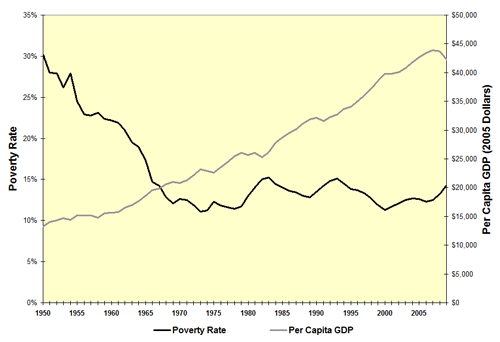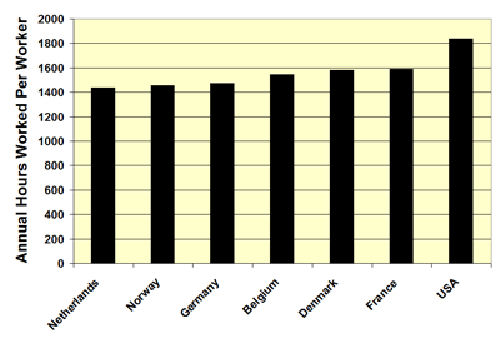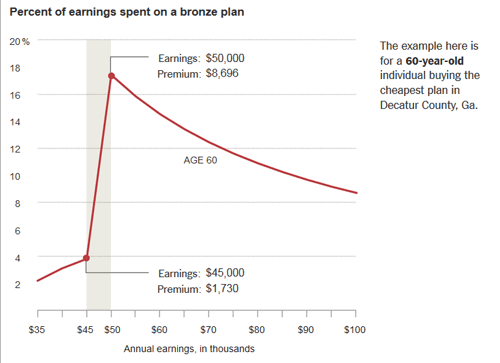
Work Time Choice: Model Policies
FAQs
Frequently Asked Questions
Q: Don't many people need to work long hours to support their families?
A: Our goal is to let people work shorter hours if they choose to. We do not want to force anyone to work shorter hours if they need or want to work longer hours.
Q: Isn't it better for the environment to encourage people to consume less rather than encouraging them to work less?
A: Consuming less and working less must go together. If people generally consume less without also working shorter hours, unemployment will increase. Increased productivity allows the average worker to produce more and more in an hour. We can keep unemployment from rising either by consuming more or by working shorter hours, or by some combination of the two.
It is also more effective politically to talk about shorter work hours. Environmentalists have spread the harsh news that we should consume less. We would be more likely to appeal to the average person by also spreading the good news that, if you consume less, you can work less.
Q: Isn't the idea of sharing the available work a fallacy, which economists call the "lump of labor fallacy"?
A: The "lump of labor fallacy" is the claim that there is only a limited amount of work to do - that it is impossible to create enough work, so we must share the available work by working shorter hours.
We do not claim that it is impossible to stimulate rapid economic growth and create more work. We claim that it is better to let people choose their work hours for these reasons:
- Better Family Lives: Our standard 40-hour week dates back to the Fair Labor Standards Act of 1938, a time when the typical American family had a father who worked full-time and a mother who stayed at home with the children. Today, 63% of American families with children have no stay-at-home parent. The labor standards of the 1930s do not give today's families the flexibility they need to balance work and family obligations. (For more information, see our page on Work Time and the Family.)
- Less Environmental Impact: It is better for the environment to allow people to choose shorter hours. If people choose to work less and to consume less, they will also pollute less. (For more information, see our page on Work Time and the Environment.)
- More Satisfying Lives: It is better for people to have the amount of work they want, rather than being forced to work standard hours. Basic economic theory tells us that people should choose what they consume, so they can have the products that give them the most satisfaction. Likewise, people should choose their work hours, so they can have the combination of income and free time that gives them the most satisfaction. (For more information, see our page on Work Time and the Good Life.)
Q: Will choice of work hours hurt the poor, who need rapid economic growth to lift them out of poverty?
A: West European countries generally have lower poverty rates than the United States, because they have more egalitarian tax systems and social policies, though they have shorter work hours:
- The Netherlands allows choice of work hours, has about half of all employees working part-time, and has a poverty rate of 4.7%, one of the lowest rates in Europe.
- The United States has a poverty rate of 15%, more than three times as much as the Netherlands.
Poverty in the United States reached a historical low of 11.1% in 1973. Poverty has increased in the last four decades, despite rapid economic growth.
As we can see in the graph, per capita GDP has increased fairly steadily since 1950. Poverty declined rapidly during the 1950s and 1960s, when prosperity was widely shared among all income groups. But poverty stopped declining in the 1970s and rose in the 1980s, as Reagan cut taxes for the rich.
Poverty and Economic Growth in the United States
Source for poverty rate: Census Bureau. Source for per capita GDP: Statistical Abstract of the United StatesThe poor nations of the world do need rapid growth to lift themselves out of poverty. But in developed nations, policies that reduce inequality are much more important to reducing poverty.
Because of increased inequality, our poverty rate has increased during the last four decades of rapid growth.
Q: Aren't France's short work hours the cause of its economic problems?
A: We hear a lot of news about France's short work hours, because of the controversy about its 35 hour work week, but most people don't know that Germany, which is Europe's economic powerhouse, has shorter work hours than France.
In fact, northern European countries with strong economies have the world's shortest work hours, as we can see in this graph.
Work Hours in Europe and the United States
source: OECDAnd which country in the Eurozone has the longest work hours? Greece, with Europe's most problematic economy.
Q: Doesn't Obamacare make it more difficult to work part-time by requiring health insurance benefits only for employees who work more than 30 hours per week?
A: Obamacare does discriminate against part-time workers by requiring health insurance only for employees who work more than 30 hours per week. But there are still many opportunities for part-time work - such as, families where one spouse has health benefits and the other wants to work short hours, people who want to work 32 hours per week instead of 40 hours, and so on.
In fact, a study by the non-partisan Congressional Budget Office (CBO) found that Obamcare would reduce the total number of hours worked in the American economy by 1.5% to 2%, primarily because people will choose to work less once they no longer need a full-time job to get health insurance. The Republicans immediately claimed that this meant Obamacare was destroying jobs, and Douglas Elmendorf, director of the CBO, responded:
"there is a critical difference between people who like to work and can’t find a job — or have a job that’s lost for reasons beyond their control — and people who choose not to work. If someone comes up to you and says, ‘The boss says I’m being laid off because we don’t have enough business to pay,’ any other person feels bad about that and we sympathize for them having lost their job. If someone says, ‘I decided to retire or stay home and spend more time with my family and spend more time doing my hobby,’ they don’t feel bad about it — they feel good about it. And we don’t sympathize. We say congratulations."
Obamacare gives people a bit more latitude to choose more time instead of more income, and Elmendorf makes the point that this sort of choice improves the quality of life.
There are even cases where Obamacare provides an incentive to work shorter hours for people who buy their own insurance, because it provides subsidies for those who earn up to four times the federal poverty level - $48,950 for an individual. If you earn more than that, your out-of-pocket cost goes up abruptly, creating what the New York Times called a "financial cliff."
The Obamacare Cliff
source: New York TimesThis graph shows that someone 60 years old who earns $50,000 per year would pay $8,696 per year for insurance. They would be better off reducing their hours by 10% - losing $5,000 in earnings and saving $6,966 on health insurance!
Savings would be less for people who are younger, but this example makes the point that Obamacare creates irrational incentives to work 30 hours or more per week, but it also creates some irrational incentives to cut your work hours to less than full-time.
We think it was a mistake for Obamacare to discriminate against part-time workers who work less than 30 hours per week. This discrimination would have been illegal in the European Union, where Directive 97/81/EC forbids discrimination against part-time workers and requires employers to pay them pro-rated benefits. It would also be illegal under International Labor Organization Convention C175, which also forbids discrimination against part-time workers and requires pro-rated benefits.
Q: Aren't shorter work hours impossible because capitalism requires the fastest possible economic growth?
A: When capitalism in the United States was at its most extreme, from 1840 until 1929, there was a steady decline in work hours. Growth would have been more rapid if people had kept working the 72-hour work-weeks of the 1840s, but unions fought for shorter work time because they believed people would be happier with more free time. (See our historical graph of American work hours.)
Since 1950, the countries of Western Europe have steadily reduced their work hours. In 1950, they had longer work hours than the United States, but now they have shorter hours. Growth would have been more rapid if they kept working longer hours than Americans, but they are happier with more free time. (See our historical graph of American and European work hours.)
Clearly, it is possible to choose shorter hours, since the United States used to do it, and western Europe is still doing it.
Q: How can people afford to work shorter hours? Most people are just barely getting by.
A: Even in the short run, many people could afford to work shorter hours. Families who earn America's median income generally are getting by economically. By definition, half of all families earn more the median; most of those in the upper half could afford to cut their work hours, if they chose to live more simply.
In the long run, we should try to make it possible for more people to cut their work hours, if they choose. In part, this is a matter of reducing economic inequality. In part, it is a matter of making it possible for people to live more simply: For example, most neighborhoods in America are designed so you cannot go anywhere without driving, which is a huge economic burden, and more people could downshift economically if we built more walkable neighborhoods.
The average employee in Germany works only 83% as many hours as the average employee in the United States, and Germany's per capita GDP is 81% as much as ours. Germans can afford to work less and earn less money, because they have less inequality than Americans, because they have controlled their health-care costs, and because they have walkable cities.

Follow Us


